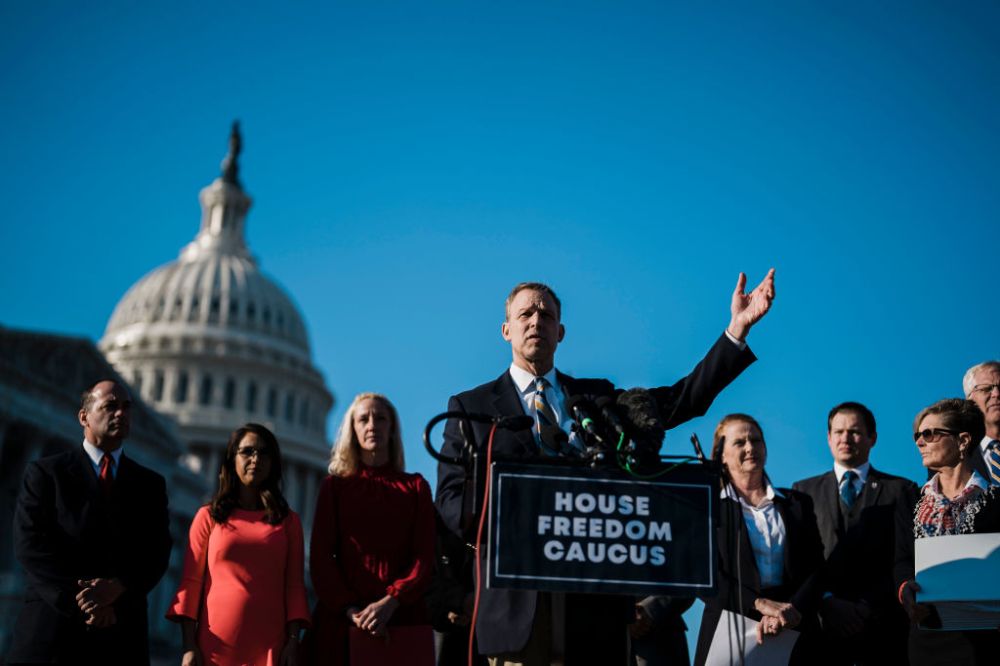The Freedom Caucus may have its best chance yet to change how the House of Representatives works. Will members seize the opportunity?
If Republicans take the House after Tuesday’s midterms—which isn’t certain but appears likely—they will hold it only with a slim margin, not the comfortable padding leaders had hoped for. That math makes groups like the Freedom Caucus and its roughly three dozen members more powerful than ever: Their votes will be essential to Republican leaders, including to elect a GOP speaker in January.
The Freedom Caucus for months has sought to strip away some of the authority congressional leaders have amassed in recent years, provoking natural resistance from Republican Leader Kevin McCarthy, who has already launched his bid to become speaker. But he may have to make greater concessions to the group than he first expected.
The Freedom Caucus made its demands public last summer, releasing proposals to change the legislative process. They may not sound exciting, but these rules tweaks could have far-reaching consequences.
One proposal is to allow amendments for all legislation brought before the whole chamber for a vote, which would give individual members much more say in shaping bills than the procedures the House usually follows. The group would also like to require all bills that come to the House floor for passage to go through committees dealing with the issues the bill touches, unless waived by the majority party members on those panels—an attempt to make sure the regular committee process is followed in debating bills instead of House leaders bringing them quickly from introduction to an up-or-down floor vote.
Most controversial among lawmakers may be the demand to restore the motion to vacate, a tool that allows members to force a vote on ousting the speaker. Former House Speaker John Boehner stepped down in 2015 after Freedom Caucus members filed a motion to vacate against him.
Another proposal would allow members of committees to elect their chairmen directly rather than GOP leaders nominating them. That’s what Alabama Rep. Mo Brooks, a member of the group who is leaving Congress this year, hopes the group will focus on in negotiations with McCarthy.
“Committee assignments, to a lesser degree, and chairmanships of committees, to a greater degree, are bought and paid for,” Brooks told The Dispatch. “Congress has been corrupted by special interest money, and anything the Freedom Caucus can do to liberate individual congressmen and senators from their reliance on that special interest money will help promote better government.”
Josh Huder, a senior fellow at Georgetown University’s Government Affairs Institute, told The Dispatch the plan for electing committee chairs would be the most impactful of the Freedom Caucus’ requests. Doing so, he said, would insulate chairs from outside pressure from party leaders and incentivize them to focus on committee work.
What if McCarthy says no? “Whoever wants to be speaker of the House has no choice,” Brooks said. “They have to give the Freedom Caucus what the Freedom Caucus reasonably demands, or else the votes are not there to be elected speaker.” He added that “I just hope that the Freedom Caucus recognizes the power and influence it has and maximizes it.”
There are at least three trains of thought within the Freedom Caucus about how to approach McCarthy, and numerous ways the group’s push for a more open process could play out.
One prominent member, Rep. Jim Jordan, is rallying behind McCarthy, who elevated Jordan to the top Republican spot on the House Judiciary Committee in 2020. McCarthy needs backing from a simple majority of the GOP conference in next week’s elections for party leadership, an easy threshold to meet after raising money and recruiting many candidates the last two cycles. But he would need support from nearly the whole conference (218 votes on the floor) in January to actually be elected speaker of the House.
Some members seem to be genuinely disenchanted with McCarthy as a leader, not simply as a show to win concessions from him. Members of the Freedom Caucus shot down McCarthy’s bid to succeed Boehner in 2015. Some conservative lawmakers are arguing this week that McCarthy won’t be aggressive enough toward the Biden administration. These may be the most dangerous for the aspiring speaker—but their influence depends on how slim the potential GOP majority is.
Rep. Andy Biggs of Arizona said this week that McCarthy rising to the speakership should not be a foregone conclusion, citing his reluctance to impeach President Joe Biden. And Rep. Bob Good of Virginia told reporters McCarthy “has not done anything to earn my vote.”
Some other caucus members are holding back endorsements and would like to pressure McCarthy to accept their demands by standing up an alternative candidate.
A founding member of the Freedom Caucus who isn’t in Congress anymore but asked to speak anonymously described the post-midterms dynamic as a “golden opportunity” to give individual members more say in legislation. But the caucus must stay unified and focus on its goals.
“The only way to get a pretty significant group of conservatives to vote for him is if he's willing to concede that leadership needs to give up some of its powers and go back to legislating and letting legislators be legislators,” he said of McCarthy.
From its start, founding members of the group wanted to open the chamber’s legislative process and give more power to rank-and-file lawmakers. It’s a concept members across the ideological spectrum can get behind—uniting people like former Rep. Justin Amash, a libertarian, and progressive Rep. Alexandria Ocasio-Cortez.
Leaders from both parties have adopted top-down, closed processes for considering most bills in recent years. Former House Speaker Paul Ryan during his tenure broke records for closed rules—a mechanism that prevents amendments to bills on the House floor—and Democratic leaders have kept a tight grip on the legislative process since taking power in 2019.
It didn’t help matters that during former President Donald Trump’s term, the Freedom Caucus shifted its attention away from empowering individual lawmakers toward being the loudest Trump allies in Congress.
Even if Freedom Caucus members don’t get every concession they want from McCarthy at the start of the new Congress, they could always try again. They will have the numbers to hold business on the House floor hostage until leaders meet demands.
“They don’t need a rule change,” Huder said. “They just need to find the courage to hold leadership accountable when they violate those stipulations.”
Quote of the Week
“If there’s a one-seat majority, my caucus has one person. It’s me. So I can decide whether a bill passes or not,” Rep. Thomas Massie of Kentucky told Politico on Election Night. “I’d be the wrong guy if you’re trying to find somebody who’s heartbroken that we don’t have a 40-seat majority.”






Please note that we at The Dispatch hold ourselves, our work, and our commenters to a higher standard than other places on the internet. We welcome comments that foster genuine debate or discussion—including comments critical of us or our work—but responses that include ad hominem attacks on fellow Dispatch members or are intended to stoke fear and anger may be moderated.
With your membership, you only have the ability to comment on The Morning Dispatch articles. Consider upgrading to join the conversation everywhere.